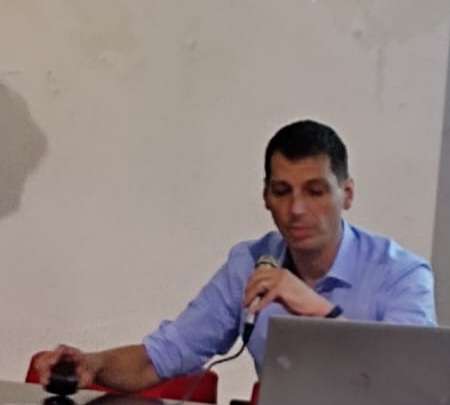Studying at the University of Verona
Here you can find information on the organisational aspects of the Programme, lecture timetables, learning activities and useful contact details for your time at the University, from enrolment to graduation.
Academic calendar
The academic calendar shows the deadlines and scheduled events that are relevant to students, teaching and technical-administrative staff of the University. Public holidays and University closures are also indicated. The academic year normally begins on 1 October each year and ends on 30 September of the following year.
Course calendar
The Academic Calendar sets out the degree programme lecture and exam timetables, as well as the relevant university closure dates..
| Period | From | To |
|---|---|---|
| Sem. IA (31.10.16 sosp.lezioni) | Oct 3, 2016 | Nov 12, 2016 |
| Sem. IB | Nov 14, 2016 | Jan 21, 2017 |
| Sem. IIA | Feb 27, 2017 | Apr 22, 2017 |
| Sem. IIB | Apr 24, 2017 | Jun 10, 2017 |
| Period | From | To |
|---|---|---|
| Festa di Ognissanti | Nov 1, 2016 | Nov 1, 2016 |
| Festa dell'Immacolata | Dec 8, 2016 | Dec 8, 2016 |
| Vacanze Natalizie | Dec 23, 2016 | Jan 7, 2017 |
| Vacanze Pasquali | Apr 14, 2017 | Apr 18, 2017 |
| Festa della Liberazione | Apr 25, 2017 | Apr 25, 2017 |
| Festa dei Lavoratori | May 1, 2017 | May 1, 2017 |
| Festa del Santo Patrono - San Zeno | May 21, 2017 | May 21, 2017 |
| Festa della Repubblica | Jun 2, 2017 | Jun 2, 2017 |
| Vacanze Estive | Aug 14, 2017 | Aug 19, 2017 |
Exam calendar
Exam dates and rounds are managed by the relevant Culture and Civilisation Teaching and Student Services Unit.
To view all the exam sessions available, please use the Exam dashboard on ESSE3.
If you forgot your login details or have problems logging in, please contact the relevant IT HelpDesk, or check the login details recovery web page.
Should you have any doubts or questions, please check the Enrollment FAQs
Academic staff

Mastrocinque Attilio
 attilio.mastrocinque@univr.it
attilio.mastrocinque@univr.it
 +39 045802 8386
+39 045802 8386
Study Plan
The Study Plan includes all modules, teaching and learning activities that each student will need to undertake during their time at the University.
Please select your Study Plan based on your enrollment year.
1° Year
| Modules | Credits | TAF | SSD |
|---|
2° Year activated in the A.Y. 2017/2018
| Modules | Credits | TAF | SSD |
|---|
| Modules | Credits | TAF | SSD |
|---|
| Modules | Credits | TAF | SSD |
|---|
Legend | Type of training activity (TTA)
TAF (Type of Educational Activity) All courses and activities are classified into different types of educational activities, indicated by a letter.
History of the Classical World (2016/2017)
Teaching code
4S003276
Teacher
Coordinator
Credits
6
Also offered in courses:
- Roman History (m) of the course Master's degree in Philosophy
- Roman History (m) of the course Master’s degree in Tradition and Interpretation of Literary Texts
- Roman History I - LM [Sede VR] of the course Master's degree in Arts (interuniversity)
Language
Italian
Scientific Disciplinary Sector (SSD)
L-ANT/03 - ROMAN HISTORY
Period
Sem. IIA, Sem. IIB
Learning outcomes
Educational aims. The course is aimed at improving the students’ knowledge of the urban culture of the Romans during the Imperial Age, the fundamental principles which the Roman society was based on, the dialectics between Romans and non-Romans, and the end of privileges for Italy. The analysis will focus on the documents concerning the rights of cities in Italy and in the provinces.
Students will be guided towards a critical analysis of the documentary sources, both archaeological and literary or epigraphic. Such an analysis will allow them to acquire the skill of distinguishing the nature and the features of the different types of documents and, subsequently, of putting them in comparison. Another acquired skill will be that of singling out the principles on which the social life of the Romans was based, the capability of these latter of integrating non-Romans into their society and politics, and also the relevance of some political acts, such as the Constitutio Antoniniana, which changed deeply the fundaments of the social life.
Program
The Severan emperors: cities and culture in the Roman Empire.
The following problems will be dealt with on the basis of sources and archaeological evidence: the historical reasons of the political and economical increase of certain provinces, the spread of new municipia in northern Africa, the grant of the Roman citizenship to all the inhabitants of the Empire, the religious transformations in the Severan age, the phenomenon of magic arts, and the imperial ideology.
| Author | Title | Publishing house | Year | ISBN | Notes |
|---|---|---|---|---|---|
| Enrico Dal Covolo e Giancarlo Rinaldi (a cura di) | Gli imperatori Severi : storia archeologia religione | LAS | 1999 | ||
| Rowan, Clare | Under divine auspices: divine ideology and the visualisation of imperial power in the Severan period | Cambridge University Press | 2012 |
Examination Methods
Form of the exam: oral exam. Questions will be posed in order to ascertain what learning and knowing level was reached. Eventually, the questions could go further in deep by focussing on texts and/or monuments discussed during the course.
Type D and Type F activities
Modules not yet included
Career prospects
Module/Programme news
News for students
There you will find information, resources and services useful during your time at the University (Student’s exam record, your study plan on ESSE3, Distance Learning courses, university email account, office forms, administrative procedures, etc.). You can log into MyUnivr with your GIA login details: only in this way will you be able to receive notification of all the notices from your teachers and your secretariat via email and soon also via the Univr app.
Graduation
Linguistic training CLA
Doppio Titolo
Il doppio titolo è un programma integrato di studio attivato a seguito di una convenzione fra l’Ateneo di Ferrara e una Università straniera.Nell'ambito del corso di laurea magistrale in Quaternario, preistoria e archeologia è attivo un progetto di doppio titolo erogato in partnership con il Master “Mention Archéologie, sciences pour l’archéologie parcours Arts, Sociétés, Environnements de la Préhistoire et de la Protohistoire: Europe, Afrique” dell’Université de Toulouse Jean Jaurès (Francia)
Gli interessati potranno candidarsi al progetto come previsto dal bando di selezione.
Per ulteriori informazioni si rimanda al bando di ammissione del doppio titolo:
http://www.unife.it/interfacolta/lm.preistoria/doppio-titolo



